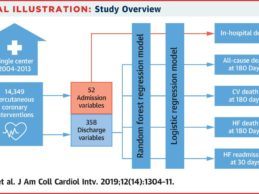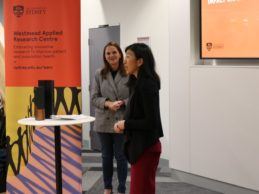For years, the healthcare industry has been abuzz with the concept of “consumerism” and the potential implications to insurance companies, providers and patients. Stakeholders from across the industry have opined on what it means create a healthcare system more focused on consumers, often with little impact to actual consumer experience or outcomes.
One spot of genuinely consumer-centric innovation and execution is in the Medicare Advantage (MA) space, where select health plans can offer
Read More
Cardiologist
Machine Learning Algorithm Can Predict Which Cardiac Patients Are High-Risk Post Discharge
- New Mayo Clinic peer-reviewed study shows Medial EarlySign’s machine learning algorithm can predict which cardiac patients are at high-risk following discharge.
- The analysis was based on electronic health records (EHR), demographics, and social data collected from a cohort of 11,709 unique Mayo Clinic patients who underwent 14,349 PCIs during 14,024 hospital admissions.
- The study suggests AI solution can be more effective than traditional models to identify patients at risk of
Read More
Google Awards $1M to U. Of Sydney to Develop AI Solution to Prevent Heart Attacks
The University of
Sydney’s Westmead Applied
Research Centre has been awarded
$1M as part of Australia’s inaugural Google.org AI Impact Challenge prize to
develop a customized digital health solution
powered by artificial
intelligence (AI) to reduce the risk of heart attacks. The prize was
presented to Westmead Applied Research Centre (WARC) led by Professor Clara Chow, a cardiologist at
Westmead Hospital and the University of Sydney’s Westmead Clinical School as
well as academic
Read More
Interoperability: Why Health Systems Need to Integrate Their Digital Stack
Several years ago, Thomas Friedman, the best-selling New York Times columnist, began pointing out how application programming interfaces (APIs) and the resultant connectivity was enabling one-touch consumer engagement with a broad range of services. We now take it for granted that we can call a car service from our phone, watch the driver approach on a map, and then pay for our ride without leaving a single application.
Similarly, we can scroll through dozens of different brands of olive oil
Read More
What’s the Difference: A Look at Consumer and Medical-Grade Wearables in Healthcare
Can both consumer and medical-grade wearables work together to fill healthcare’s care gaps? Dr. Sunil Kapur shares his insights.
What does Abbott’s Confirm Rx insertable cardiac monitor (ICM) and the latest Apple Watch have in common? The answer: more than you think, and perhaps not nearly enough. Today, consumer and medical-grade wearables may live in different markets, but they are aligning on a similar long-term objective—capturing critical data to improve outcomes.
“People want to
Read More
Stanford Researchers Develop Algorithm to Diagnose Heart Arrhythmias
Stanford researchers from the Machine Learning Group have developed an algorithm that is able to outperform cardiologists in arrhythmia detection, according to research published on arXiv. The new deep learning algorithm can diagnose 14 types of heart rhythm defects, called arrhythmias and has the ability to sort through data from rural locations where people do not have routine access to cardiologists. Traditionally, patients suspected to have an arrhythmia will often get an electrocardiogram
Read More






